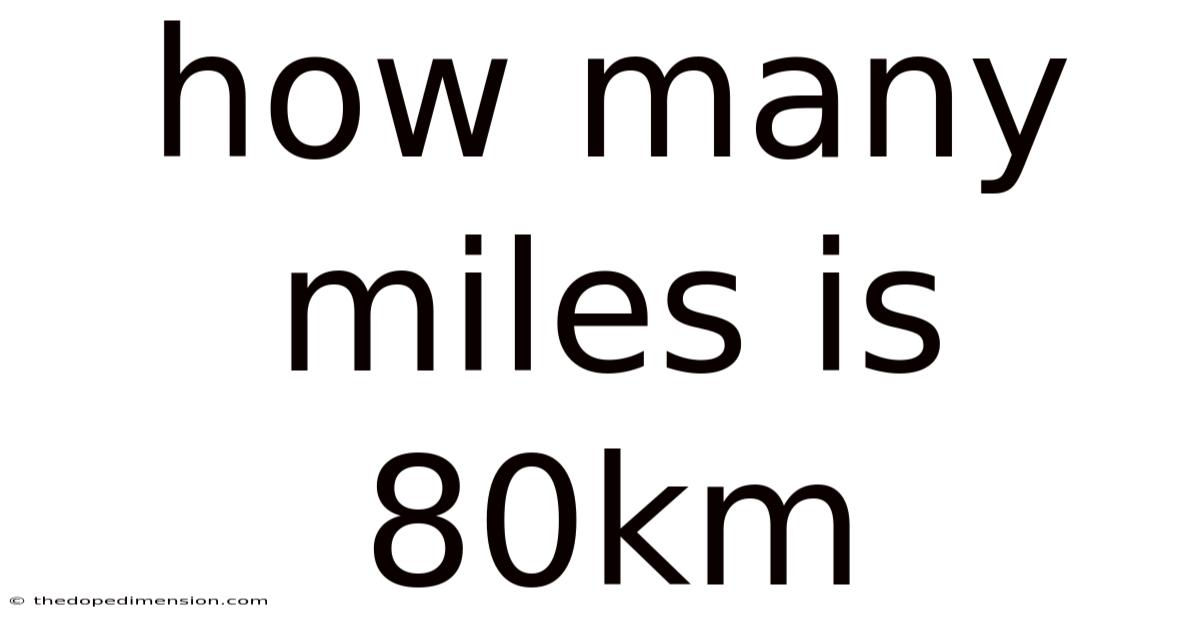How Many Miles Is 80km
thedopedimension
Sep 20, 2025 · 4 min read

Table of Contents
How Many Miles is 80km? A Comprehensive Guide to Metric-Imperial Conversions
Understanding the relationship between kilometers (km) and miles is crucial for anyone who travels internationally, reads maps with different unit systems, or works with data that uses both metric and imperial units. This comprehensive guide will not only answer the question "How many miles is 80km?" but will also equip you with the knowledge and tools to perform these conversions independently, ensuring you can confidently navigate the world of distance measurements.
Introduction: Bridging the Gap Between Kilometers and Miles
The question, "How many miles is 80km?" highlights the ongoing need for conversion between the metric system (primarily used globally) and the imperial system (still prevalent in some countries). While many countries have officially adopted the metric system, understanding both systems remains essential for clear communication and accurate calculations. This article will delve into the precise conversion, provide multiple methods for calculating the distance, explore the history behind these units, and address frequently asked questions surrounding kilometer-to-mile conversions.
How Many Miles is 80km? The Exact Conversion
Simply put, 80 kilometers is approximately 49.71 miles. This conversion is based on the standard conversion factor: 1 kilometer equals 0.621371 miles. Therefore, multiplying 80km by 0.621371 gives us the precise mileage. However, for most practical purposes, rounding to 49.7 miles or even 50 miles offers sufficient accuracy.
Methods for Converting Kilometers to Miles
There are several ways to convert kilometers to miles, each offering a different level of precision and convenience.
-
Using the Conversion Factor: This is the most accurate method. As mentioned earlier, multiply the number of kilometers by 0.621371 to get the equivalent in miles. For 80km, the calculation is 80km * 0.621371 miles/km ≈ 49.71 miles.
-
Using an Online Converter: Numerous websites and apps provide instant kilometer-to-mile conversions. Simply enter the number of kilometers, and the converter will calculate the equivalent in miles. These tools are user-friendly and eliminate the need for manual calculations.
-
Using a Conversion Chart: A pre-calculated conversion chart can be helpful for quick reference. However, these charts typically offer approximate values and may not be as precise as using the conversion factor directly.
-
Using a Calculator with Conversion Function: Many scientific or advanced calculators have built-in conversion functions that simplify the process. These calculators often allow for direct input of kilometers and immediate output in miles.
A Deeper Dive: Understanding Kilometers and Miles
To fully appreciate the conversion, understanding the historical context and definitions of kilometers and miles is beneficial.
-
Kilometers (km): The kilometer is a unit of length in the metric system. It's a multiple of the meter, the base unit of length. One kilometer is equal to 1000 meters. The metric system is based on powers of 10, making conversions within the system relatively straightforward.
-
Miles (mi): The mile is a unit of length in the imperial system. Its origin can be traced back to the Roman mille passus, meaning "thousand paces." Over time, the definition of a mile has varied slightly across different regions and eras. The modern international mile is defined as exactly 1609.344 meters.
The Significance of Accurate Conversions
Accurate conversions are crucial in various applications:
-
Navigation and Travel: GPS devices and maps often use different unit systems, requiring accurate conversions for planning routes and understanding distances.
-
Scientific Research: Scientific data often involves measurements in both metric and imperial units, demanding precise conversions for accurate analysis and comparisons.
-
Engineering and Construction: Engineering projects may involve specifications in either system, making conversions vital for compatibility and precision.
-
International Trade: Global trade requires accurate conversions to ensure proper measurements for goods and materials.
Frequently Asked Questions (FAQs)
-
Why are there different unit systems? The metric system and the imperial system evolved independently, with the metric system being designed for simplicity and consistency, while the imperial system developed organically over centuries.
-
Which unit system is better? The metric system is generally preferred globally due to its ease of use and consistency. Its decimal-based structure simplifies calculations and reduces errors.
-
Are there other units of distance? Yes, many other units of distance exist, including yards, feet, inches (imperial), and centimeters, millimeters (metric).
-
How can I improve my conversion skills? Practice is key! Regularly perform conversions and use different methods to improve accuracy and efficiency.
Conclusion: Mastering Kilometer-to-Mile Conversions
Knowing how to convert kilometers to miles is a valuable skill in our increasingly interconnected world. Whether you're planning a road trip, interpreting scientific data, or simply curious about distance measurements, understanding the conversion process and its applications empowers you to communicate effectively and navigate various measurement systems with confidence. Remember that 80 kilometers is approximately 49.71 miles, but always use the appropriate conversion factor for the highest degree of accuracy. With practice and the methods outlined above, you'll quickly master kilometer-to-mile conversions and confidently navigate the world of distances.
Latest Posts
Latest Posts
-
16 9 Fl Oz In Ml
Sep 20, 2025
-
200 Ml To Fl Oz
Sep 20, 2025
-
How Long Is 166 Minutes
Sep 20, 2025
-
How Long Is 0 5 Meters
Sep 20, 2025
-
What Is 5000m In Miles
Sep 20, 2025
Related Post
Thank you for visiting our website which covers about How Many Miles Is 80km . We hope the information provided has been useful to you. Feel free to contact us if you have any questions or need further assistance. See you next time and don't miss to bookmark.